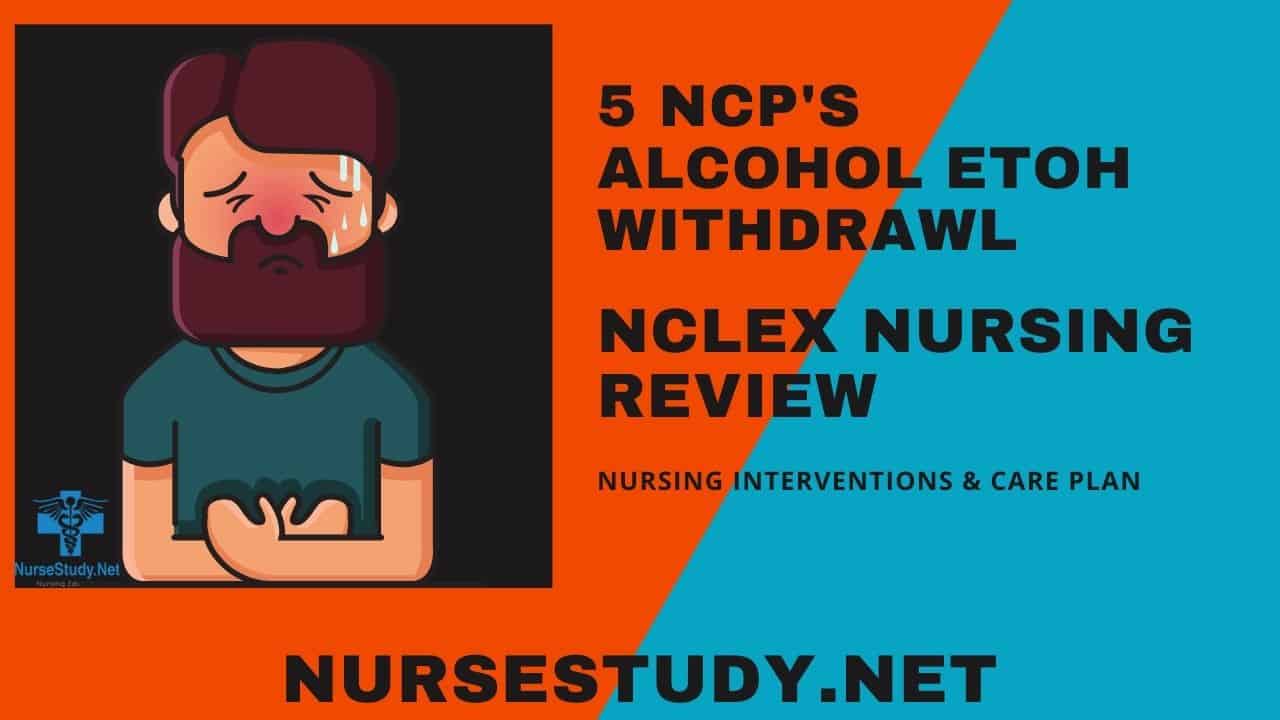Alcohol Withdrawal Syndrome occurs when individuals who have developed a physical dependence on alcohol suddenly cease or significantly reduce their intake. As a central nervous system depressant, alcohol creates profound changes in brain chemistry. When withdrawn, the brain experiences a state of hyperexcitability, leading to potentially severe and life-threatening symptoms.
Clinical Manifestations
Symptoms typically begin within 6-24 hours after the last drink and may include:
- Tremors and anxiety
- Elevated blood pressure and tachycardia
- Diaphoresis and hyperthermia
- Confusion and disorientation
- Hallucinations (visual, tactile, or auditory)
- Seizures
- Delirium tremens (in severe cases)
The Nursing Process in AWS Management
Effective management of AWS requires a systematic nursing approach focusing on:
- Early identification and assessment
- Regular monitoring using validated tools (CIWA-Ar scale)
- Implementation of appropriate interventions
- Continuous evaluation of patient response
- Documentation and care coordination
Essential Nursing Care Plans for AWS
Nursing Care Plan 1. Risk for Injury
Nursing Diagnosis: Risk for Injury related to cognitive impairment, altered psychomotor functioning, and seizure potential.
Related Factors:
- Confusion and disorientation
- Impaired judgment
- Seizure activity
- Balance disturbances
- Hallucinations
Nursing Interventions and Rationales:
Implement fall precautions
- Maintain bed in lowest position
- Ensure the call light is within reach
- Use bed alarms when appropriate
Establish seizure precautions
- Pad side rails
- Keep suction equipment readily available
- Monitor neurological status frequently
Provide constant observation if necessary
- Assign 1:1 sitter for high-risk patients
- Document behavior changes
Maintain safe environment
- Remove potential hazards
- Keep pathways clear
- Ensure adequate lighting
Desired Outcomes:
- The patient will remain free from injury
- The patient will demonstrate improved coordination and balance
- The patient will maintain safe behavior
Nursing Care Plan 2. Disturbed Thought Processes
Nursing Diagnosis: Disturbed Thought Processes related to neurotransmitter imbalances and CNS excitability.
Related Factors:
- Alcohol withdrawal
- Electrolyte imbalances
- Sleep deprivation
- Metabolic changes
Nursing Interventions and Rationales:
Perform frequent orientation assessments
- Document level of consciousness
- Assess for confusion
- Monitor for hallucinations
Provide reality orientation
- Use clear, simple communication
- Maintain consistency among care providers
- Place clock and calendar in the room
Create calming environment
- Reduce noise levels
- Maintain appropriate lighting
- Limit visitors when necessary
Monitor vital signs and laboratory values
- Track electrolyte levels
- Assess blood glucose
- Monitor liver function tests
Desired Outcomes:
- The patient will demonstrate improved thought processes.
- The patient will maintain orientation to person, place, and time
- The patient will show decreased signs of confusion
Nursing Care Plan 3. Anxiety
Nursing Diagnosis: Anxiety related to withdrawal symptoms and physiological changes.
Related Factors:
- Chemical dependency
- Physical withdrawal symptoms
- Fear of complications
- Loss of control
- Environmental stressors
Nursing Interventions and Rationales:
Assess anxiety levels using standardized tools
- Document frequency and severity
- Monitor physical manifestations
- Track CIWA-Ar scores
Implement anxiety-reduction techniques
- Teach deep breathing exercises
- Provide guided imagery
- Encourage relaxation techniques
Administer medications as ordered
- Give benzodiazepines per protocol
- Monitor medication effectiveness
- Document response to interventions
Establish therapeutic relationship
- Maintain non-judgmental attitude
- Provide emotional support
- Encourage the expression of feelings
Desired Outcomes:
- The patient will report decreased anxiety levels
- The patient will demonstrate improved coping skills
- The patient will show reduced physical symptoms of anxiety
Nursing Care Plan 4. Imbalanced Nutrition: Less Than Body Requirements
Nursing Diagnosis: Imbalanced Nutrition: Less Than Body Requirements related to decreased appetite and metabolic changes.
Related Factors:
- Poor nutritional intake
- Nausea and vomiting
- Altered metabolism
- Decreased appetite
- Thiamine deficiency
Nursing Interventions and Rationales:
Assess nutritional status
- Monitor weight
- Track intake and output
- Evaluate laboratory values
- Provide appropriate diet
- Offer small, frequent meals
- Ensure adequate protein intake
- Monitor tolerance
Administer vitamin supplementation
- Give thiamine as ordered
- Monitor for deficiency symptoms
- Document response
Manage nausea
- Provide antiemetics as ordered
- Encourage oral hygiene
- Monitor hydration status
Desired Outcomes:
- The patient will demonstrate improved nutritional intake.
- The patient will maintain a stable weight
- The patient will show no signs of vitamin deficiency
Nursing Care Plan 5. Ineffective Coping
Nursing Diagnosis: Ineffective Coping related to substance dependence and withdrawal symptoms.
Related Factors:
- Chemical dependency
- Poor coping mechanisms
- Limited support system
- Stress of hospitalization
- Fear of change
Nursing Interventions and Rationales:
Assess coping mechanisms
- Identify triggers
- Evaluate support systems
- Document coping strategies
Provide education
- Teach stress management
- Discuss addiction resources
- Explain treatment options
Facilitate support system involvement
- Encourage family participation
- Connect with support groups
- Provide resource information
Develop aftercare plan
- Arrange follow-up care
- Connect with community resources
- Establish support network
Desired Outcomes:
- The patient will demonstrate improved coping strategies.
- The patient will identify triggers and risk factors
- The patient will participate in treatment planning
References
- Day, E., & Daly, C. (2022). Clinical management of the alcohol withdrawal syndrome. Addiction, 117(3), 804-814. https://doi.org/10.1111/add.15647
- Journal of Clinical Nursing (2023). “Evidence-Based Management of Alcohol Withdrawal Syndrome: A Systematic Review.”
- American Journal of Nursing (2024). “Current Approaches to Nursing Care in Alcohol Withdrawal Syndrome.” Volume 124, Issue 3, 45-52.
- Critical Care Nursing Quarterly (2023). “Implementation of Evidence-Based Protocols for Alcohol Withdrawal Syndrome.” Volume 46, Issue 2, 178-189.
- Journal of Addiction Nursing (2024). “Nursing Interventions in Alcohol Withdrawal: A Meta-Analysis.” Volume 35, Issue 1, 12-24.
- International Journal of Mental Health Nursing (2023). “Best Practices in Nursing Care for Alcohol Withdrawal Syndrome.” Volume 32, Issue 4, 890-902.
- Nursing Research and Practice (2024). “Clinical Outcomes in Nurse-Led Alcohol Withdrawal Management.” Volume 15, Issue 2, 225-237.
